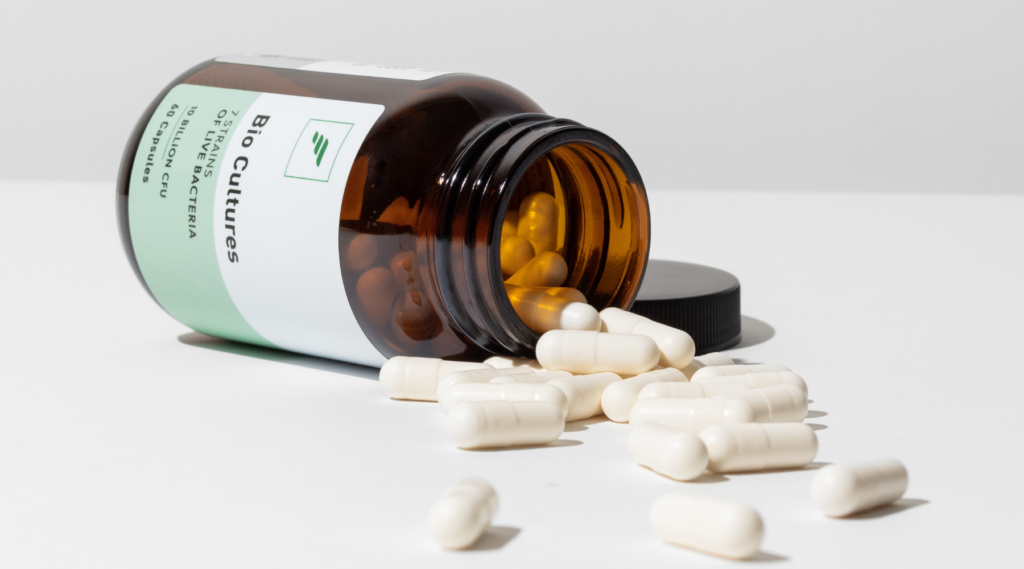Bio Cultures

What are bio cultures?
Bio cultures are live microorganisms that tend to provide us with health benefits. They’re often referred to as ‘Probiotics’ or called “good” bacteria as they differ from the microorganisms that cause disease.
Probiotics could help to maintain a healthy community of microorganisms by increasing the levels of good bacteria and reducing the ability of harmful bacteria to survive. They can also have the potential to help your body to return to a healthy condition after being disturbed (illness and/or antibiotics) and produce substances that have a desirable effect or influence your body’s immune response (1).
Probiotics can be found in fermented food like yoghurt, kimchi, tempeh and kombucha.
Probiotics are sometimes confused with prebiotics. Prebiotics are a type of fibre that our body can’t digest properly, so this passes to our gut where it feeds healthy gut bacteria.
For who do we recommend a supplement?
There’s growing evidence that a healthy gut can have a big impact on our overall health by reducing the risk of chronic disease, improving metabolism and supporting our immune system (2).
Apart from your physical health, the microorganisms in our gut can also impact our mental health. Gut diseases linked to dysbiosis of our microbiome such as IBS and Crohn’s disease also increase the risk of mental illnesses such as depression and anxiety (3, 4). The exact mechanisms aren’t fully understood yet but the gut microbiome seems to communicate with our central nervous system through the “second brain”, or enteric nervous system that covers our GI tract. This is called the gut-brain axis and there seems to be two-way traffic between them. Research has shown that mental stress can have a major impact on our gut health. It alters the environment of our gut in favour of pathogenic microbes. It makes the gut lining more permeable for pathogens and reduces mucus production (5, 6).
To keep our gut happy the main focus should lie on having a balanced diet and lifestyle, but bio cultures can help if you have any further concerns about your gut health.
Studies have shown that there’s a rationale for probiotic treatment to help with stress-related intestinal disorders (6). Furthermore a probiotic can also help to treat antibiotic-associated diarrhoea or traveller’s diarrhoea (7, 8).
For people suffering from IBS (Irritable Bowel Syndrome) bio cultures may help in managing the symptoms (9). More research is needed to discover the most effective strains in terms of IBS management, and this could be different from person to person. For this reason, we would recommend speaking with your doctor or registered dietitian first.
FFF Supplement Dose.
10 Billion CFU
Why choose supplements from Fresh Fitness Food?
Unlike some other popular bio cultures on the market, which usually only contain 1 or 2 strains of friendly bacteria, our capsules include 7 different strains which have been carefully selected by our team of nutritionists. We’ve also included a well known prebiotic within our capsules.
When it comes to our health, the food we put in our bodies can have a significant impact in many ways. It affects our mood, energy levels, stress, physical activity and everything in between. The right nutrition can help us to feel better, every day. At Fresh Fitness Food we believe in a food-first approach as food provides you with so much more than just nutrients. Many of us should be able to get most nutrients from a healthy and balanced diet, however, there are some caveats and exceptions where food supplements can assist to fill up the gaps.
If you are unsure or have any questions about food supplements, you can book in for a call with one of our all-knowing nutritionists here (link: https://meetings.hubspot.com/fffcall/supplements-consultation).
Fresh Fitness Food provides personalised meal plans delivered straight to your door, ensuring not only that you have the nutrients you need to manage your stress levels, but also that you have the time usually spent shopping, cooking and washing up, to engage in your favourite stress-reducing activity. To discuss which nutrition plan is right for you, book a call with our in-house nutrition team here.
Order today and start smashing your goals with personalised nutrition!
Get £50 off a 5-day trial with code: BLOG50. Start your trial here
References:
- Sánchez, B., Delgado, S., Blanco-Míguez, A., Lourenço, A., Gueimonde, M. and Margolles, A., 2016. Probiotics, gut microbiota, and their influence on host health and disease. Molecular Nutrition & Food Research, 61(1), p.1600240.
- Asnicar, F. et al. 2021. Microbiome connections with host metabolism and habitual diet from 1,098 deeply phenotyped individuals. Nature Medicine, 27(2), pp.321-332.
- Matarazzo, I., Toniato, E. and Robuffo, I., 2019. Psychobiome Feeding Mind: Polyphenolics in Depression and Anxiety. Current Topics in Medicinal Chemistry, 18(24), pp.2108-2115.
- Collen, A. (2015). 10% Human: How Your Body’s Microbes Hold the Key to Health and Happiness. UK: William Collins Publishers.
- Carabotti, M., Scirocco, A., Maselli, M. A., & Severi, C. (2015). The gut-brain axis: interactions between enteric microbiota, central and enteric nervous systems. Annals of gastroenterology, 28(2), 203-209.
- Lutgendorff, F., Akkermans, L. and Soderholm, J., 2008. The Role of Microbiota and Probiotics in Stress-Induced Gastrointestinal Damage. Current Molecular Medicine, 8(4), pp.282-298.
- Hempel, S. et al. 2012. Probiotics for the Prevention and Treatment of Antibiotic-Associated Diarrhea. JAMA, 307(18), p.1959.
- McFarland, L., 2007. Meta-analysis of probiotics for the prevention of traveler’s diarrhea. Travel Medicine and Infectious Disease, 5(2), pp.97-105.
- McKenzie, Y, et al. 2016. British Dietetic Association systematic review of systematic reviews and evidence-based practice guidelines for the use of probiotics in the management of irritable bowel syndrome in adults (2016 update). Journal of Human Nutrition and Dietetics, 29(5), pp.576-592.